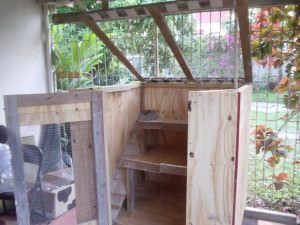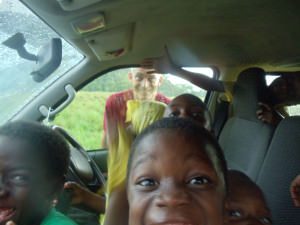Nature vs Nurture

Starting in the month of May, Pat and I will begin our endeavor of raising chickens from a day old chick to adulthood. They will be completely reliant on us for the first two weeks of their lives while they live in the brooder we built for them until we place them in the larger chicken coop where they will finally have some freedom to literally grow their wings and fly, albeit very short distances and in a fairly enclosed area. Along with our coop, we will be building a good sized garden next to the coop. Our hope for both of the projects is to supply our food kitchen with more diverse, nutritional, and low-cost foods.
On mentioning our project to people in our community, we’re immediately asked, “How are you going to protect it,” or told everyone will steal from it, or a variation of the two.
At first, Pat and I usually just looked at each other with some surprise, but after a while we were prepared to answer these queries. “We will get a dog, it’s going to be enclosed with gates and locks, we will build solar motion lights, we will set up tents nearby and never sleep again, full lock down security with satellite imaging,” and so on.
However, the conclusion is that there is a reality in Sav and that reality is people steal… a lot.
We have decided to protect our small investment, but we will not go to extravagant lengths to do so because it is the reality. Not only for us, but for every person living in the community, thieving is a part of life.
So as Pat and I prepare for parenthood, the question in my mind is, “How do you raise a child properly in this environment?”
Last Monday, two young boys around the age of 13 came to our gate. The first boy, already helping himself to our mango trees, told me to buy him some football shoes. The other stood silently while I pointlessly bickered with the other over the concept of earning shoes. I offered them both a job, while the footballer scoffed and said he had to go and play, the silent boy took me up on my offer and went to work.
The next day, the footballer came again, this time with two different friends and ever so politely inquired again about getting him shoes, stating “You’re white, you have money.” I explained that I’m a volunteer and am not paid to be here. I was immediately accused of being a liar. I agreed to give them two mangoes each and they left… or so I thought.
I was working in the back field, out of sight of everyone. When I finished, I learned from the caretaker over at the Hall, that the three boys had climbed onto the roof and attempted to steal the music equipment we have stored on the second level. They didn’t get away with anything, but it was obvious they cared very little for other people’s property.
Today, the silent boy came back to the gate around 8 a.m. and asked if I had any work for him. Unfortunately for him, he had done such a good job two days before, there really wasn’t much work left to do. But, he insisted he could find more to do, so I let him at it.
I mentioned that his friend came back the day before and attempted to steal. He said, “We not friends anymore, he tried fighting me.” Again, he did a terrific job and I asked him to come back next week when we start to build the chicken coop.
The nature/nurture argument is a relatively old one, so which one affects the psyche of children more? The two boys have basically the same environment, one could assume very similar educational backgrounds and similar socioeconomic standing, but how do they have such completely different attitudes toward work and respect?
Without doing a full case study of the two, you would have to assume the silent boy has a stronger foundation, better role models, and has been given a clearer understanding of respect of people and property. Time and time again, I have seen the importance of good parenting and how deeply it impacts a child and his or her ability to understand the world and learn how to have it work for you rather than against you. Too few children in Sav have strong role models; you can talk about the cycle of poverty and all that encompasses it, but children will learn by example, rich or poor.
I cannot predict of the future of either child or the future of our chickens for that matter, but I will do my best to be a person they can rely and depend on, whenever they call…or cluck.
P.S. Thanks Mom and Dad
Tagged in:


